Darya Gunay - Russian Cases: Conjugate Russian Nouns, Pronouns and Adjectives like a Pro. Rules, Conjugation Tables, Exercises, Keys:
Here you can read online Darya Gunay - Russian Cases: Conjugate Russian Nouns, Pronouns and Adjectives like a Pro. Rules, Conjugation Tables, Exercises, Keys: full text of the book (entire story) in english for free. Download pdf and epub, get meaning, cover and reviews about this ebook. year: 2020, publisher: Darya Gunay, genre: Detective and thriller. Description of the work, (preface) as well as reviews are available. Best literature library LitArk.com created for fans of good reading and offers a wide selection of genres:
Romance novel
Science fiction
Adventure
Detective
Science
History
Home and family
Prose
Art
Politics
Computer
Non-fiction
Religion
Business
Children
Humor
Choose a favorite category and find really read worthwhile books. Enjoy immersion in the world of imagination, feel the emotions of the characters or learn something new for yourself, make an fascinating discovery.
- Book:Russian Cases: Conjugate Russian Nouns, Pronouns and Adjectives like a Pro. Rules, Conjugation Tables, Exercises, Keys:
- Author:
- Publisher:Darya Gunay
- Genre:
- Year:2020
- Rating:3 / 5
- Favourites:Add to favourites
- Your mark:
Russian Cases: Conjugate Russian Nouns, Pronouns and Adjectives like a Pro. Rules, Conjugation Tables, Exercises, Keys:: summary, description and annotation
We offer to read an annotation, description, summary or preface (depends on what the author of the book "Russian Cases: Conjugate Russian Nouns, Pronouns and Adjectives like a Pro. Rules, Conjugation Tables, Exercises, Keys:" wrote himself). If you haven't found the necessary information about the book — write in the comments, we will try to find it.
Cases are the backbone of the Russian sentence structure. However, for many Russian language learners, cases remain a stumbling stone. This is because nouns, pronouns, and adjectives conjugate in Russian (change their endings) which makes these words look different within a text.
The good news is: you can actually learn the conjugation rules and understand the context for using each case.
Everything else you learn in Russian will group around cases, just like the walls of a house are built on its foundation.
Youll be able to conjugate - and speak Russian - like a PRO!
This e-book will help you understand the Russian case system. It will also give you numerous examples of word combinations, full sentences, as well as idiomatic expressions with only 1 static case possible alongside their English translation. Overall, you will learn 500+ words from basic Russian vocabulary.
This 2nd edition is significantly improved based on readers' feedback: tables are enlarged, more examples are given.
Each chapter dedicated to a specific case describes the exact situations when each case is used backed by color-coded conjugation tables (tables with endings and examples), which you can always keep handy and return to.
A special focus is put on immediate practice: you will find short exercises at the end of each chapter along with the keys. This will help you put the newly-acquired knowledge into action and check if you understood everything correctly.
Complementary chapters give an overview of the gender system of Russian nouns and their plural forms.
Russian adjectives; personal and possessive pronouns, and their conjugation in all Russian cases now have separate chapters.
The book also now features a very useful bonus a text in Russian where each noun is decoded to illustrate the use of cases within phrases. This way you can go back to the book chapters and review the usage.
Russian Cases: Conjugate Russian Nouns, Pronouns, and Adjectives Like a Pro is probably the most comprehensive resource on Russian cases you may come across. Keep it nearby and refer to it when necessary. Happy learning!
Darya Gunay: author's other books
Who wrote Russian Cases: Conjugate Russian Nouns, Pronouns and Adjectives like a Pro. Rules, Conjugation Tables, Exercises, Keys:? Find out the surname, the name of the author of the book and a list of all author's works by series.

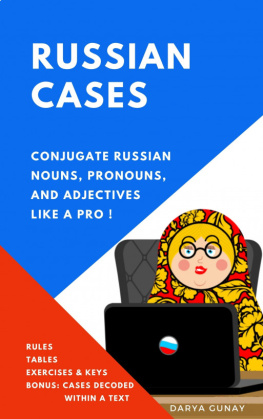
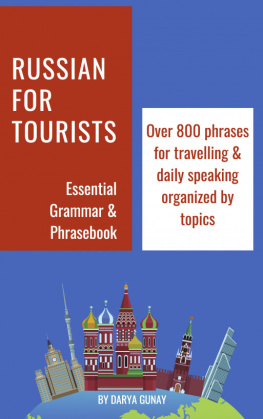
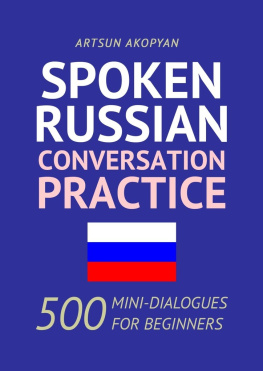
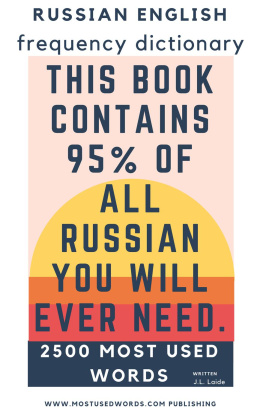


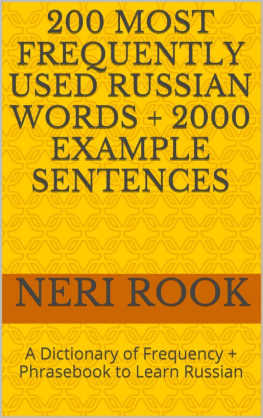

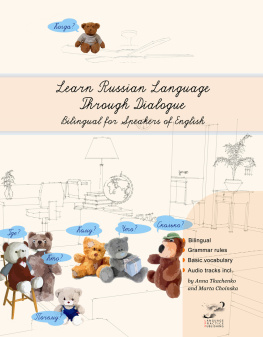
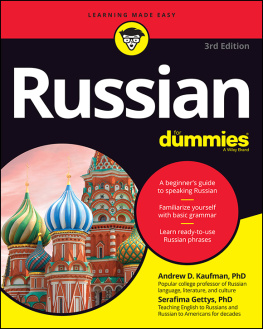
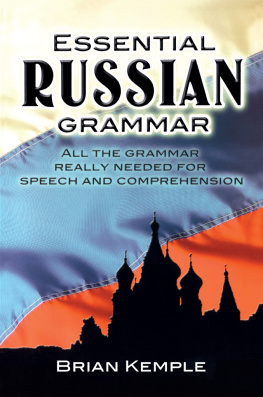
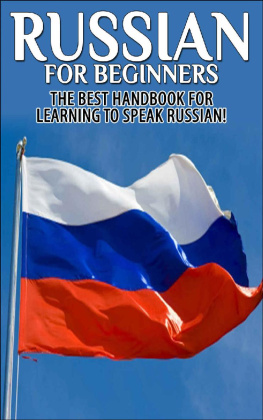
 Dear Russian language learners, you are aboutto unlock the most important subject in the Russian grammar. Thisbook will help you tackle one of the most challenging topics in theRussian language right away (for beginners) and/or systematize yourknowledge of Russian cases (for not-complete-beginners). Let me start by saying that cases are thebackbone of the Russian sentence structure. Therefore, once youunderstand the conjugation rules, the context and the reason whyeach case is used, all your subsequent efforts to learn Russianwill come with ease.
Dear Russian language learners, you are aboutto unlock the most important subject in the Russian grammar. Thisbook will help you tackle one of the most challenging topics in theRussian language right away (for beginners) and/or systematize yourknowledge of Russian cases (for not-complete-beginners). Let me start by saying that cases are thebackbone of the Russian sentence structure. Therefore, once youunderstand the conjugation rules, the context and the reason whyeach case is used, all your subsequent efforts to learn Russianwill come with ease.